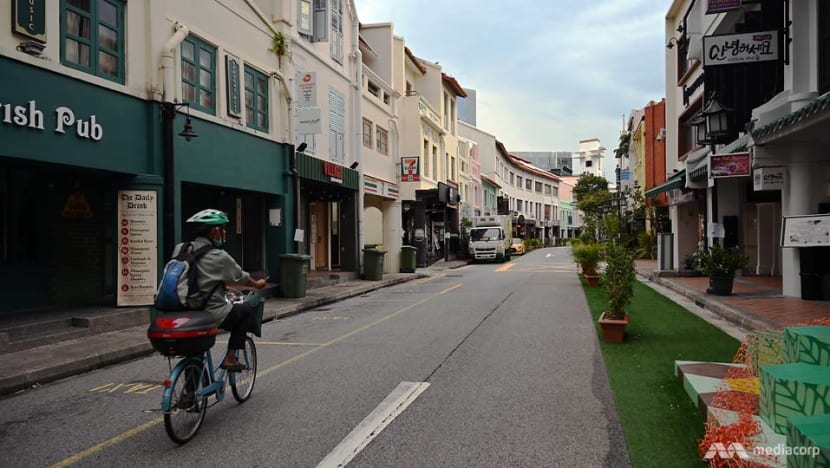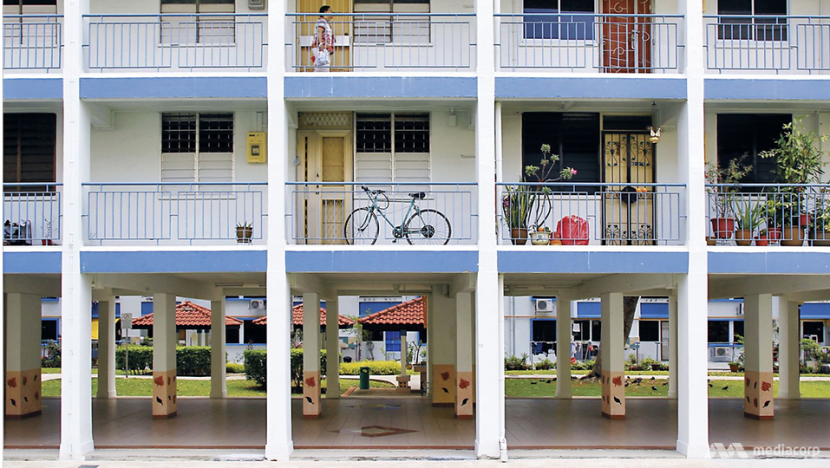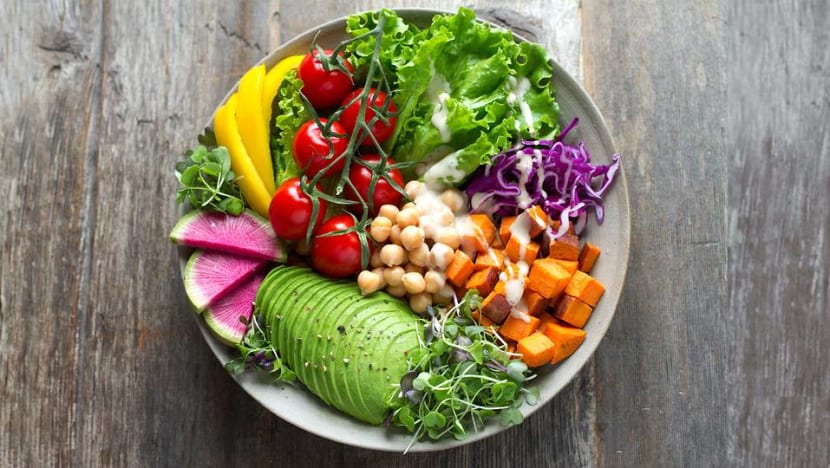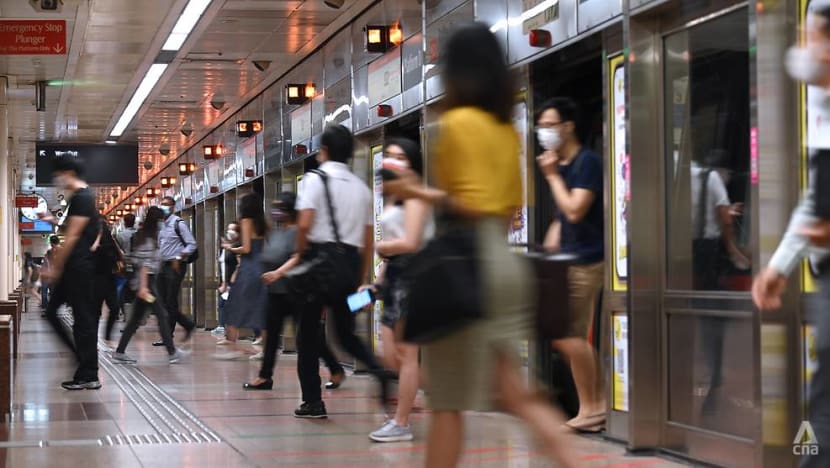commentary Commentary
Commentary: Trying to live more sustainably? It’s impossible to make a difference alone
In combating climate change, our individual efforts are statistically insignificant – especially when compared to what businesses and government can achieve, says climate activist Ho Xiang Tian.

A lone cyclist rides through Circular Road in Singapore, where most shops are closed amid circuit breaker measures in May 2020 to contain the spread of COVID-19. (Photo: Marcus Mark Ramos)
SINGAPORE: We’re all familiar with the threat of climate change.
We also know what we must do: Reduce our emissions to net zero by 2050 to have a 50 per cent chance of limiting global temperature rise to 1.5 degrees Celsius.
Yet, a common solution among individuals is frantically accounting for every gram of their carbon footprint, hoping that every little action counts when it comes to climate change.
This is also encouraged by governments and corporations, with messages to practise the 3Rs and switch off lights when not in use.
But if we stop to think about it, our individual efforts are statistically insignificant, especially when compared to what businesses and governments can achieve.
READ: Commentary: S$5 tank tops can end up costing too much
Take cooling as an example.
Using the fan instead of the air-conditioner to keep cool is a common message to get individuals to reduce their carbon footprint. Unfortunately, air-conditioning in homes only account for 2 per cent of carbon emissions in Singapore. In contrast, air-conditioning in non-residential buildings account for 8 per cent of carbon emissions in Singapore.
To lower emissions from cooling in Singapore, many things can be done. Alternative cooling methods can be developed. Buildings can be painted a lighter shade. Plants can be used to reduce the ambient temperature.
READ: Commentary: Singapore could be a model for cooler cities in a world heating up
None of these can be done by individuals. Try painting your HDB flat’s exterior walls white to reduce heat gain of the building, or try planting many trees around your estate and you’ll likely be fined or asked to undo your changes.
In non-residential buildings, the building design actually makes it impossible for natural and mechanical ventilation to be sufficient for the building, as recent guidelines on improving ventilation in buildings to prevent the spread of COVID-19 has shown.

In this case, systemic change is needed. HDB has to implement a policy to paint HDB flats a lighter shade. Mechanical and natural ventilation have to be mandated in non-residential buildings instead of air-conditioning. Associated rules, such as dress codes, have to change too to fit the new policies.
READ: Commentary: Shorts and slippers aren’t sloppy – they’re sensible attire for Singapore’s weather
REDUCE, REUSE AND RECYCLE?
Waste production is another example. Individuals in Singapore generated 915g of waste per day on average in 2019, about 334kg per person that year, and collectively all individuals in Singapore generated 1.87 million tonnes of waste.
It is a staggeringly huge amount but is only about a quarter of total waste generated in Singapore. The rest comes from the non-domestic sector.
A lot of effort is then spent on trying to recycle rather than reduce our waste, but recycling is another area where individual action could easily be negated.
If you throw a clean plastic bottle into the blue recycling bin, but the bin gets contaminated, all its contents would have to be incinerated. Your efforts would have literally gone to waste.
READ: Commentary: Why does Singapore still lack a recycling ethos?
Unfortunately, 40 per cent of recyclables collected in Singapore’s blue bins are contaminated and sent for incineration.
Under the National Recycling Programme, a blue recycling bin is placed below every HDB block. Even if most residents know to place only clean recyclables in the bin, it takes one person to dump a bowl of laksa into the bin to ruin the efforts of everyone else.
There might be an argument that education would help prevent that, but realistically the number of people who know how to recycle properly and actually do so will never hit 100 per cent.
This shows that the existing system is flawed and needs to be changed to achieve the aim of increasing Singapore’s recycling rates, but no amount of proper recycling from an individual can change that.
READ: Commentary: Taking Singapore’s green ambitions to new heights with a circular economy
DISTRACTIONS FROM TRUE PROGRESS
Focusing solely on individual actions could also distract from metrics that are able to measure if true progress exists.

There is a growing plant-based movement in Singapore, where people choose to reduce their consumption of animals and animal products for ethical and/or environmental reasons. According to a 2020 YouGov survey, two in five Singaporeans are on a flexitarian diet, meaning they eat mostly plant-based foods while eating meat and animal products in moderation.
However, data from the Singapore Food Agency shows that the overall amount of meat imported into Singapore has an increasing trend from 2010 to 2019. This means that more animals than ever are being farmed and killed for human consumption in Singapore.
In this context, it might seem like individual efforts to reduce meat consumption might be better used to engage in systemic change instead.
This could include encouraging eateries to introduce more plant-based options or getting event organisers to make plant-based meals the default.
READ: Commentary: Going meatless doesn’t have to be a dilemma for the Singaporean foodie
READ: Commentary: Is lab-grown meat a new frontier or a passing fad?
Individual efforts might even end up doing harm. Case in point being the plastic alternatives currently available in the market.
A 2017 lifecycle analysis commissioned by NEA shows that in Singapore’s context, biodegradable disposables might not be better for the environment. They’re made of plastic and additives to catalyse degradation.
But because waste is incinerated in Singapore, rather than buried in landfills, these products cannot degrade, so are not different from plastic in terms of environmental impact.
Many shops and retailers offer biodegradable alternatives in a bid to do their part for the environment. Consumers who don’t know how waste in Singapore is handled support this, in the mistaken belief they’re doing good, but it ultimately ends up doing more harm than good.
READ: Commentary: Paying for a plastic bag isn't enough to change our dependence on it
WALKING THE TALK
This is not to discourage individual action. Despite all I’ve written, I try to do my part – reduce my use of disposables, recycle, use a fan instead of an air-conditioner and take public transport instead of private transport.

These actions might be statistically insignificant, but they help me live my life in line with my values.
It is important to do things that make us feel good about ourselves, but we must remember it is not enough to take individual action.
We need to learn why things are the way they are now, rethink the assumptions we might have about how things are supposed to be, and work at changing the systems that shape the way we behave.
After all, individual efforts can have an outsized impact. Such efforts could be joining a local environmental group, participating in citizen’s workgroups organised by the government, or getting businesses to change their current practices.
READ: Commentary: What good will Coldplay’s vessel cleaning up Malaysia rivers do?
READ: Commentary: Work of Singapore climate activists has only just begun
Efforts by the People’s Movement to Stop Haze managed to get several eateries to switch to using RSPO-certified oil, which helps to reduce haze from forest fires.
A Deposit Refund Scheme and disposable bag charge raised by the Citizen’s Workgroup on Recycling Right and Citizen’s Workgroup on Reducing the Excessive Use of Disposables are now being studied for implementation, and will lead to increasing recycling rates of beverage containers and reducing the amount of disposable bags used respectively.
These efforts were made by a relatively small group of people, but the impact is far greater than if they just took individual action and nothing else.
Our lifestyle choices do have a place in raising awareness and helping us live with our conscience. But if we truly care about any issue, we need to think bigger to really make a difference.
Ho Xiang Tian is the co-founder of informal environmental group LepakInSG.














